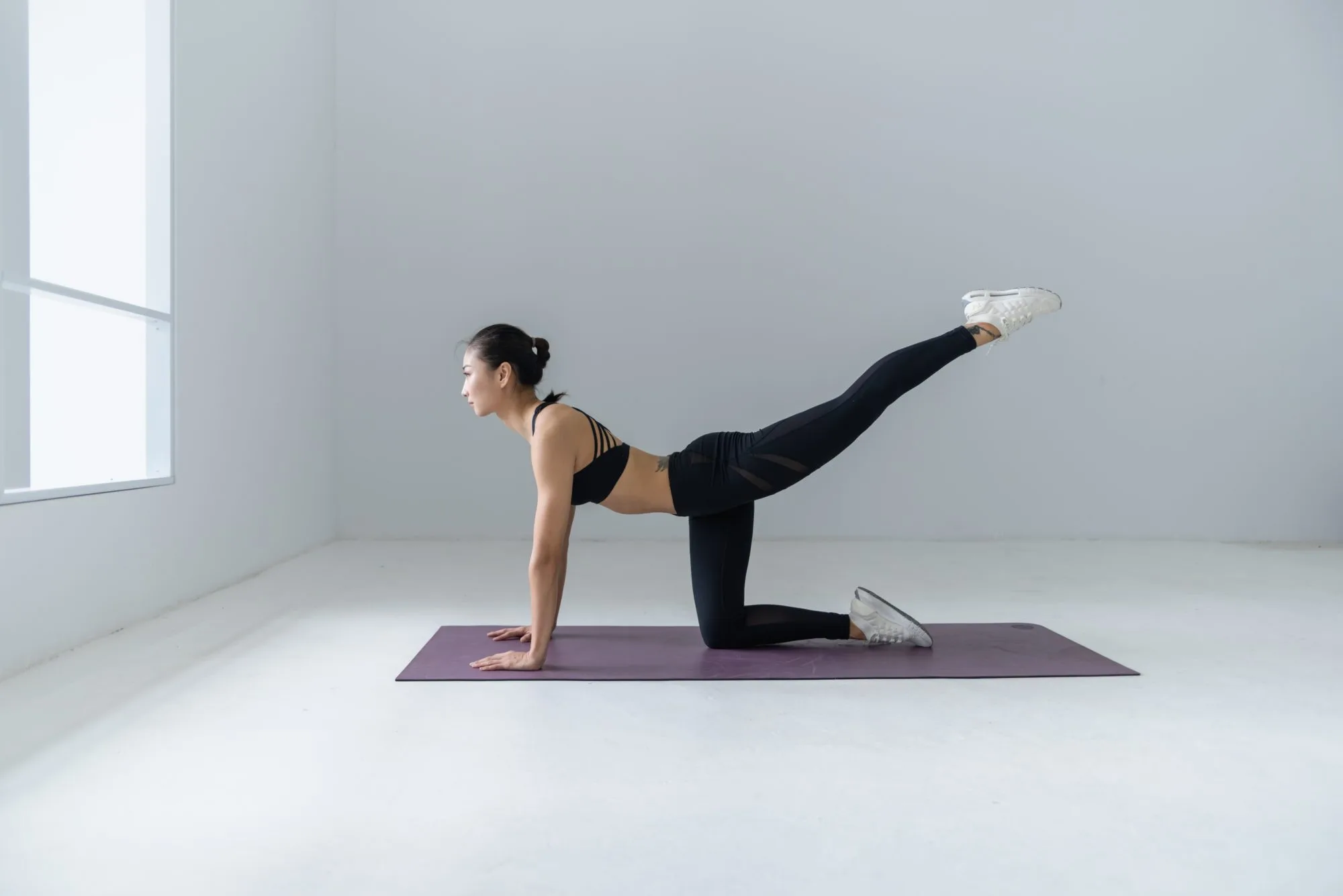Tampon adverts have long implied that your period is a time to get active. You’ll be familiar with their unmistakable formats: a woman plays tennis, does ballet, fences in all whites, each activity seemingly as easy as the next. You may watch these adverts with a raised eyebrow and a hint (or a lot) of cynicism, unconvinced by the exaggerated image of exercising on your period.
Plus, if you’re one of the millions of women who suffer from PMS bloating or cramping you may feel the image of a woman curled up in the fetal position clutching a hot water bottle to her stomach is closer to your reality.

Photo by Jonathan Borba on Unsplash
However, I urge you to hold your cynicism for just a moment, because there is a gem of learning we can take from these exaggerated formats. The truth is that working out whilst on your period can be very beneficial, particularly in alleviating painful symptoms. In fact, statistically, women who don’t exercise are the ones more likely to suffer more painful side effects.
Break the period taboo.
The issue is that women have long been in the dark about how exercise can help. But thanks to brand activism, education, and awareness, things are changing. The culture of body acceptance is growing, and period talk is becoming less taboo and more commonplace. In fact, over the past ten years alone, the volume of people searching for information on ‘periods’ has increased 175%* and it’s amazing to see.
Tune into the ups and downs of your cycle.
It’s massively important to take your cycle into account when you’re working out because varying hormones influence your body’s energy levels. Author and period preacher, Lucy Peach, suggests thinking of your monthly cycle as the season of the year. Like the seasons, each hormonal phase brings its own benefits and drawbacks.
By tuning in to how your mind and body feel as you move through each of the four phases, you’ll develop the ability to work with and not against your body’s physiology and hormone fluctuations. Not only will this help you make the most of fitness adaptations, but it will also help alleviate period symptoms and you’ll no longer think of your period as a fleeting nuisance.
The idea that there is a better time to exercise, however, is a complete misconception. Rather, matchmaking the type and intensity of the exercise you do with each phase of your monthly cycle and listening to your body, will help you be the best possible you through the whole month.
Here’s how to master your menstrual cycle with exercise:
Phase 1: Focus on rest and restoration.
It’s ‘winter’, technically referred to as the menstrual phase. Your hormones are flat-lined and progesterone and estrogen have dropped. It’s likely your energy levels have plummeted, and you may be feeling down and experiencing strong menstrual cramps.

Photo by Polina Zimmerman from Pexels
This is the time to be realistic. It’s unlikely you’ll have the mental and physical strength to push through an intense workout, and it’s completely normal to feel fragile, so this is the time to focus on a practice that nourishes your mind and body. Protect yourself from disappointment by doing something achievable; a long walk, a gentle swim, or a stretch class and if you feel capable, some light cardio or a run could be magic for your body.
To help alleviate symptoms, focus your practice around slow stretching and scheduling in a Pilates or yoga session. Both practices can help with niggling issues such as lower back pain, headache, or tummy pain. One pose that is great for period cramps is child’s pose; this flexes your reproductive organs, as well as releases tension in your back, shoulders, and neck.
Winter can be the most challenging, but your body will thank you for the benefits that come with exercising, so do what you can to avoid skipping exercise in this season altogether.
Phase 2: Relish in rising energy levels.
Spring has arrived – officially known as the follicular phase. As estrogen levels increase, your energy levels will rise, and you’ll feel more open to trying new things. This is the perfect phase of your cycle to book yourself onto that new exercise class you’ve had your eye on for a while.
![exercise [longevity live]](https://longevitylive.com/wp-content/uploads/2018/11/balance-body-exercise-374101-320x213.jpg) You may also start to feel stronger and more motivated to smash a workout. Plus, you could find you wake up earlier and feel more refreshed – maximize this extra time and energy with exercise.
You may also start to feel stronger and more motivated to smash a workout. Plus, you could find you wake up earlier and feel more refreshed – maximize this extra time and energy with exercise.
Phase 3: Embrace high-intensity exercise.
It’s summer, the time when your estrogen levels peak and testosterone spikes. You may find this to be the phase you feel you can take on the world, take more risks, and conquer your personal bests.
Harness the opportunity this feel-good season brings and prioritize high-intensity workouts like HIIT and heavy cardio.
Despite this being your “yes” phase, the challenge of this season is to avoid giving everything away. Autumn is just around the corner, and you’ll be grateful to have reserved some energy for this trickier time.
Phase 4: Protect your energy levels.
Autumn – the luteal phase – is here. This final stage of your cycle can be as testing as the season itself.
A combination of rising and falling hormones means your energy will begin to deplete, and you may only be able to perform at about 60% of your normal capacity. It’s perfectly normal to feel the frustration in this phase – you may find you aren’t performing at your optimum level and give up easily.
Accepting that you may have less to give in this phase will help protect your motivation and disappointment. Pay attention to your body and give it what it needs – if you feel you have bounds of energy, go heavy, increase the intensity or length of the workout. On the flip side, if you feel your energy levels plummet, lighten your load and schedule a less challenging session.

Photo by Polina Zimmerman from Pexels
Remember the key, as always here, is to listen to your body, it likely knows you better than you know yourself.
—
*Volume of Google searches for the word “period” between October 2010 and October 2020.
Who is the author?
Anna Cousins is an online personal trainer, offering individual PT workout sessions and a wealth of different group sessions. Anna is a level 4 qualified personal trainer as well as a nutrition and weight management coach.
Online sessions range from HIIT, boxercise, dance, Pilates, resistance bands, stretching, kettlebells and much more so there is something for everyone. Whatever the session, Anna offers a truly fun and enjoyable workout which is totally achievable at home.




![women [longevity live]](https://longevitylive.com/wp-content/uploads/2020/01/photo-of-women-walking-down-the-street-1116984-100x100.jpg)










